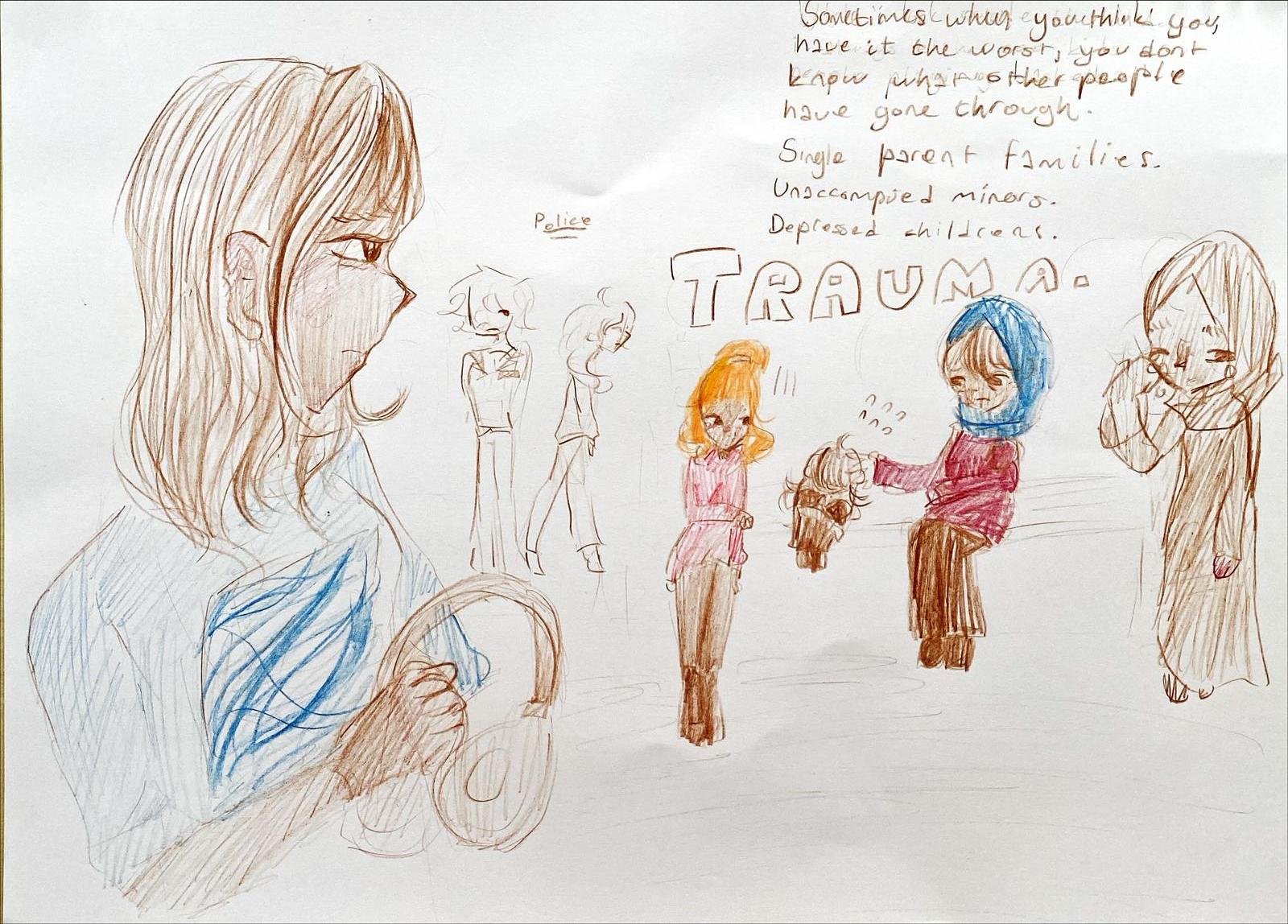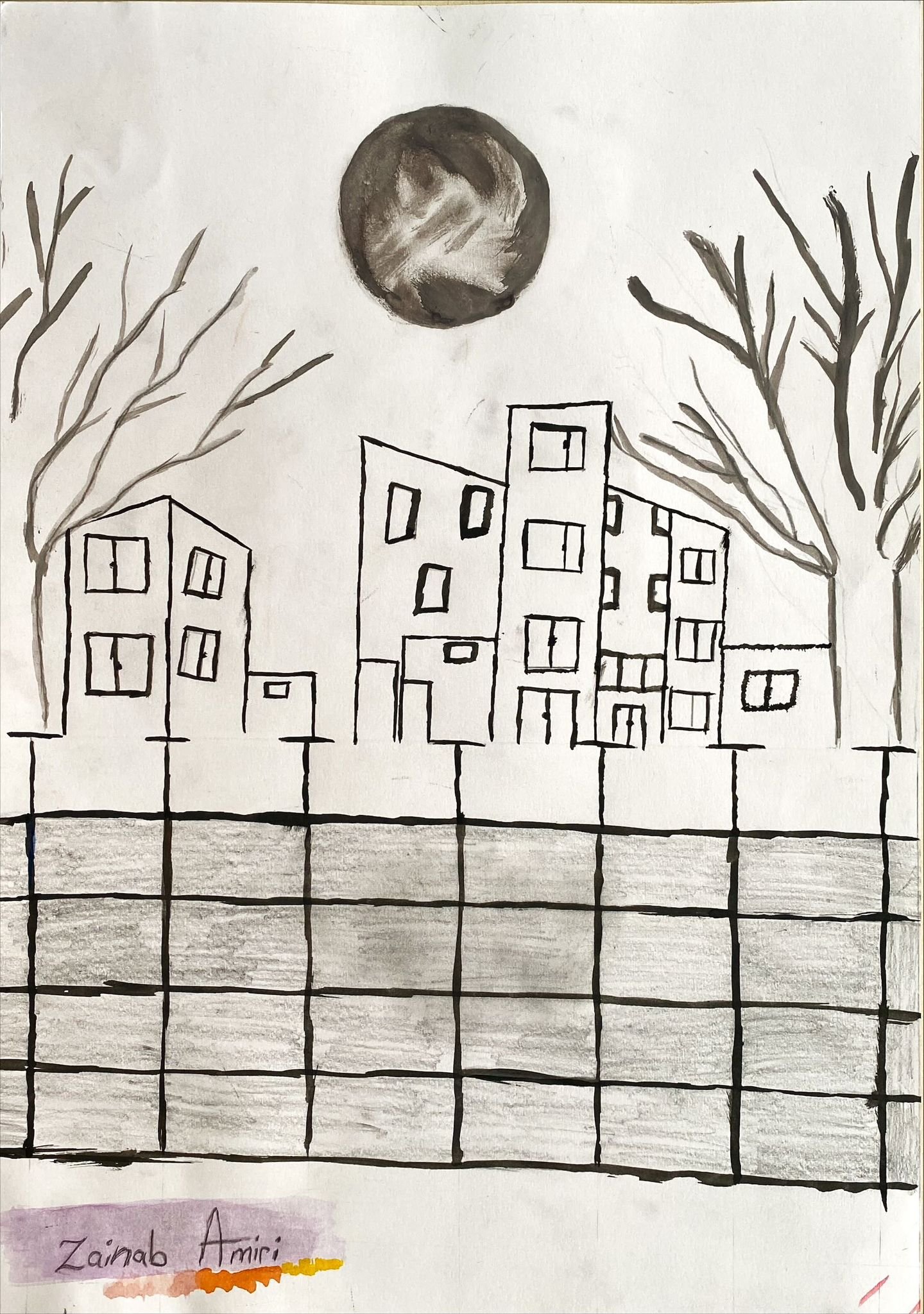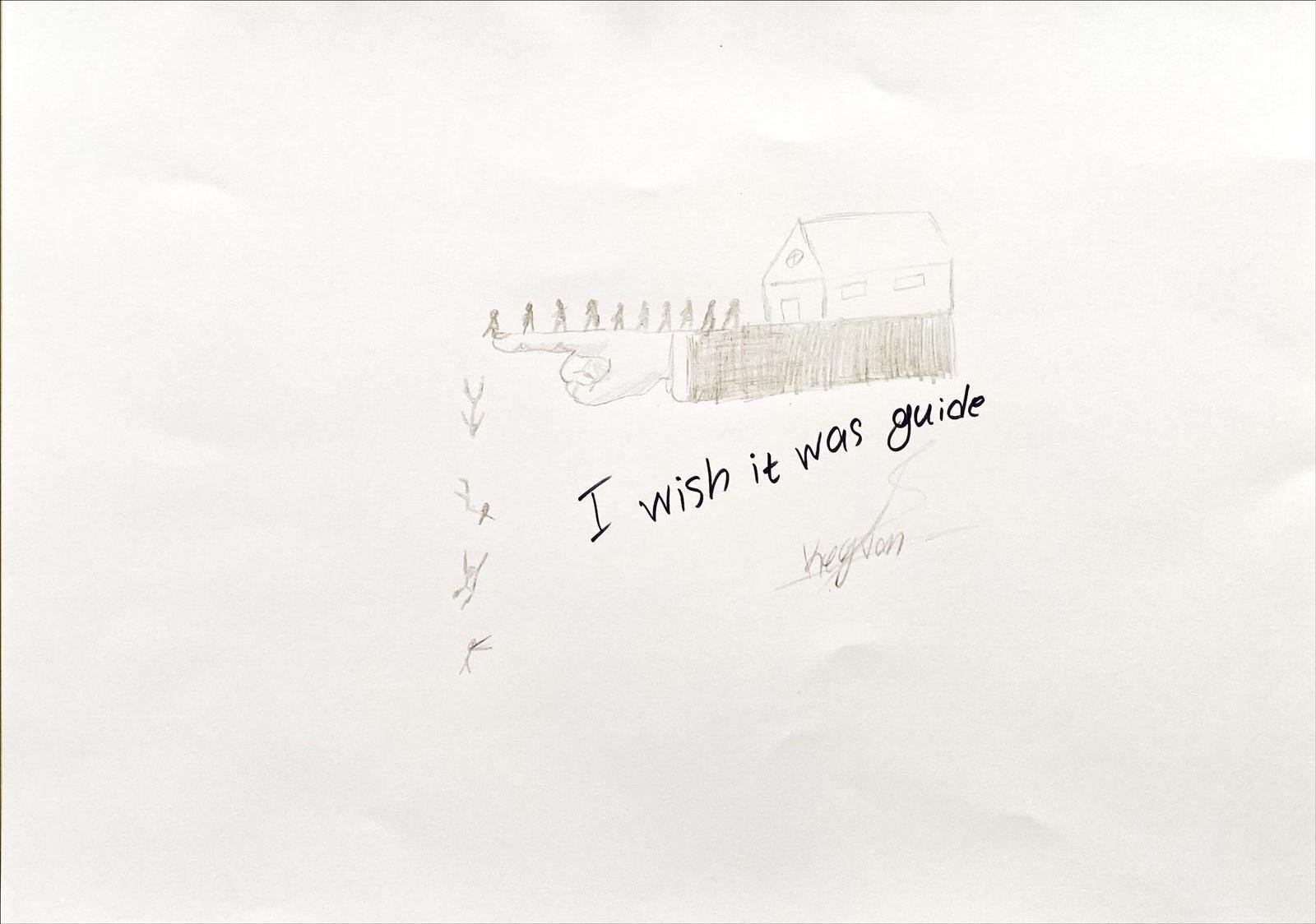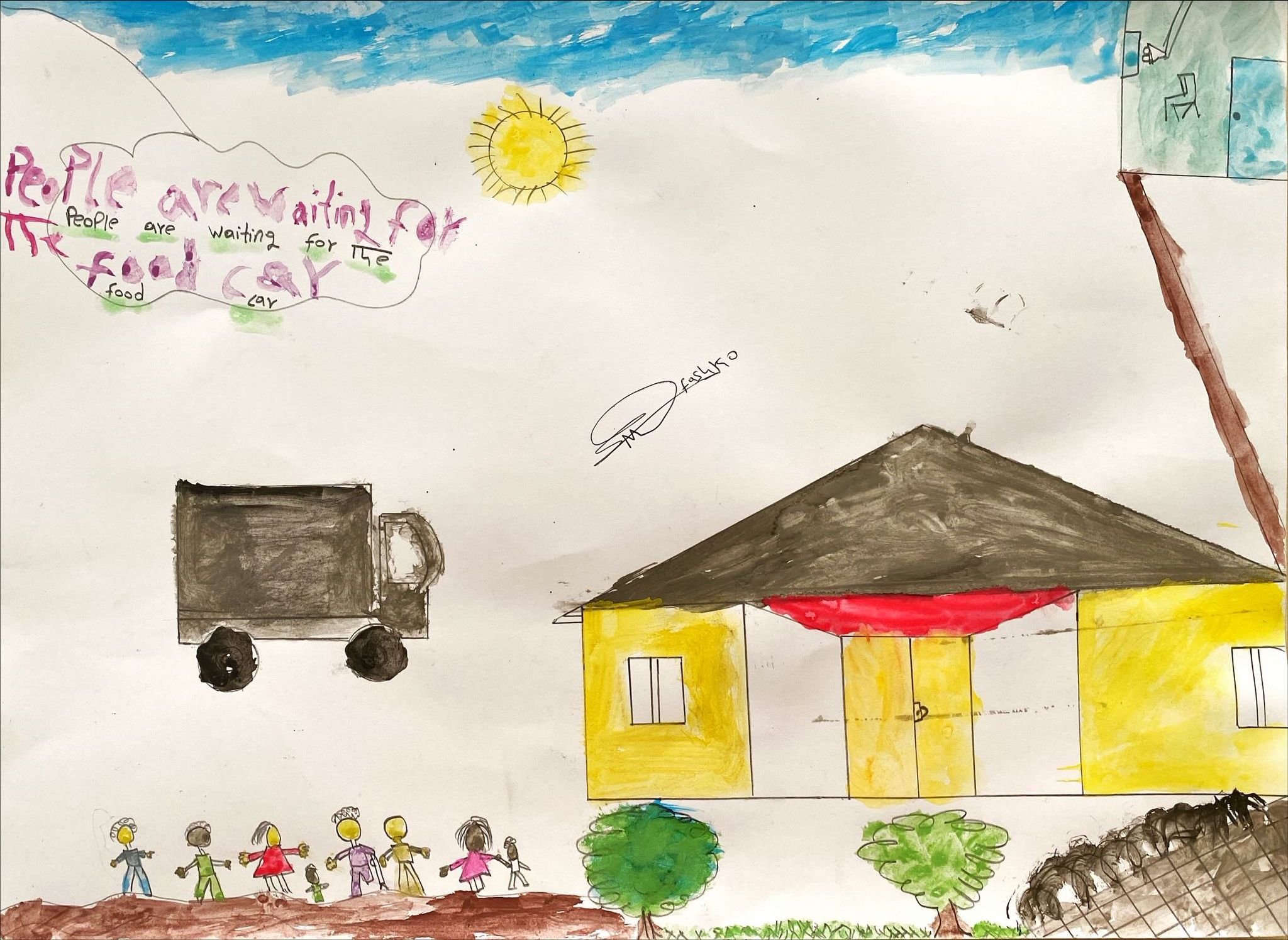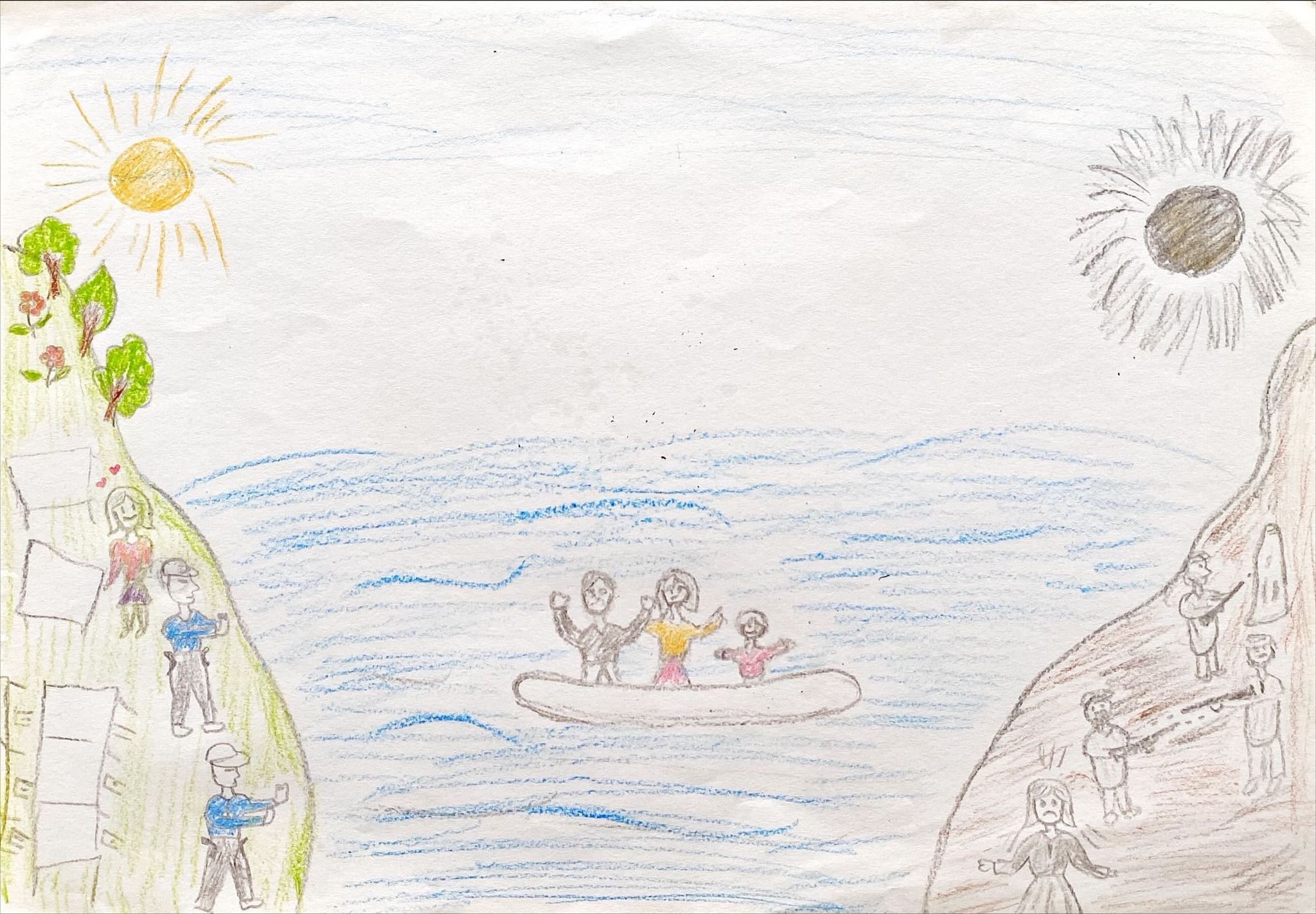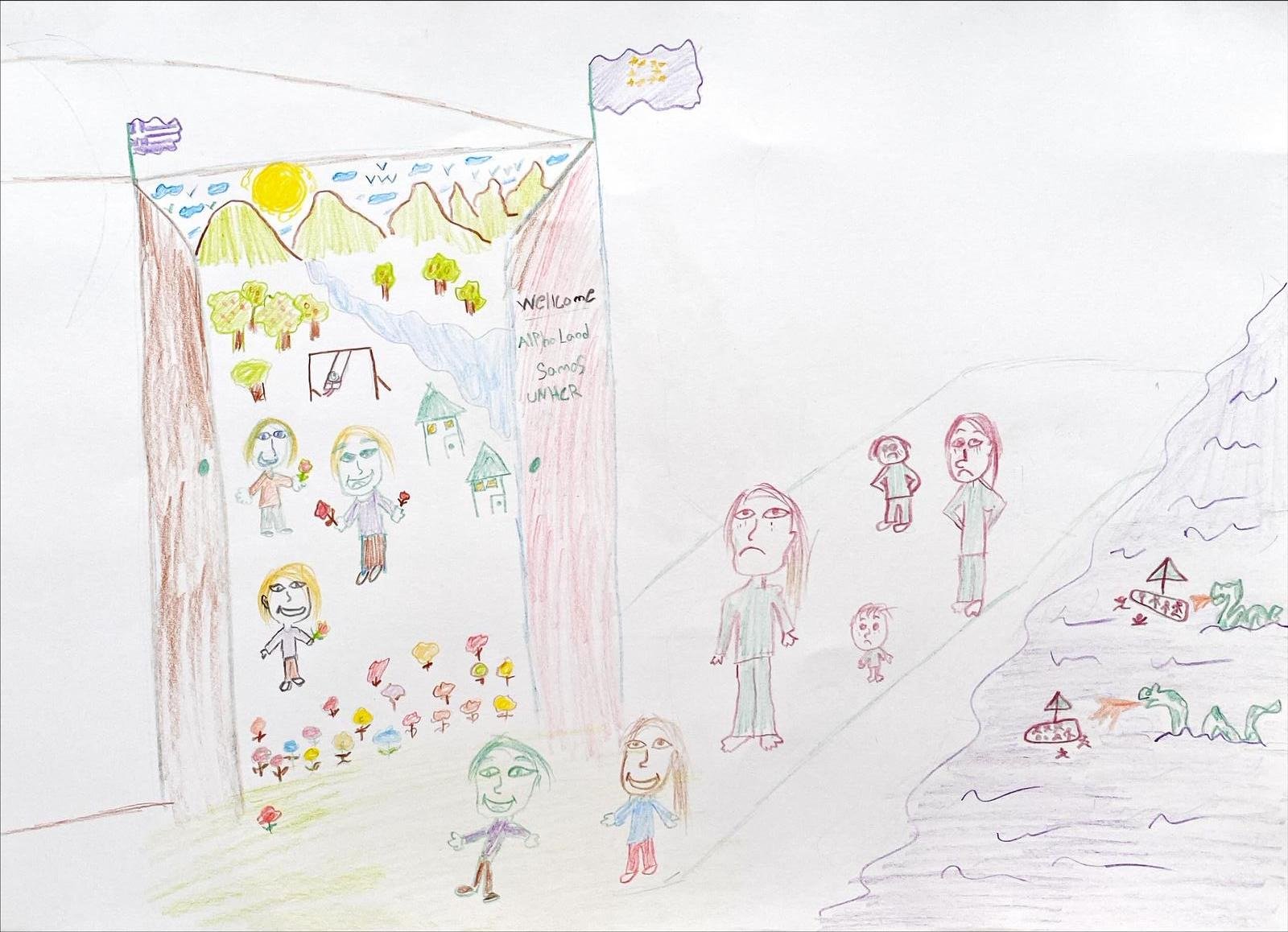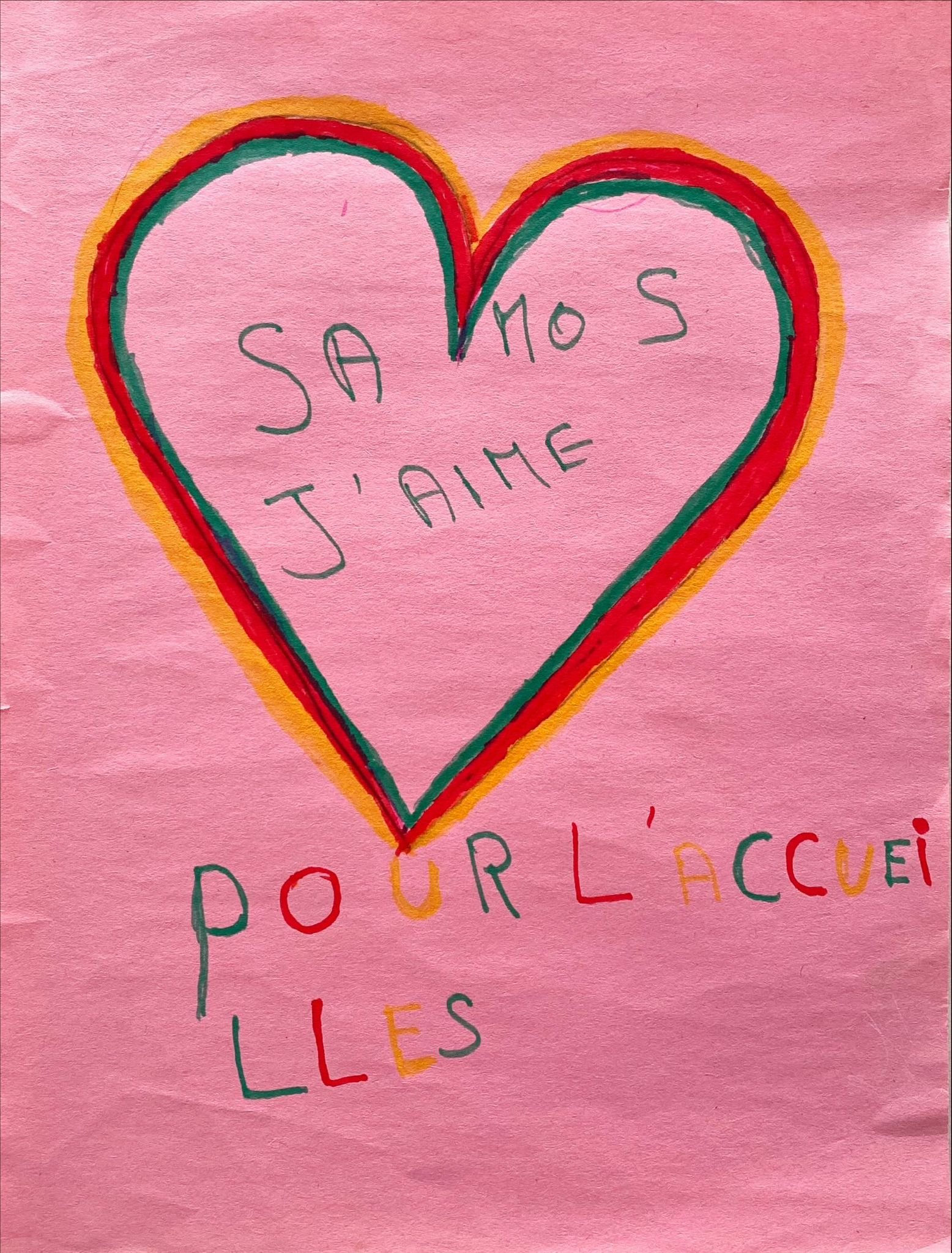“We feel in prison on the island” - Artworks from Amnesty Report on Samos Refugee Camp
In May 2024, Amnesty and Samos Volunteers organised a workshop to reveal the realities and personal experiences of the residents in the closed-controlled access centre (CCAC) opened on Samos in 2021.
The people who were attending the workshop were invited to respond to prompts, including:
“How do you feel living in the Samos camp?”; “What would you like to change in Samos?”; “What do you hope for in the future?” The participants could use any form of expression, such as art or written form, that they preferred.
The closed-controlled access centre on Samos is a ‘pilot’ project funded by the EU to improve the efficiency of asylum claim processes. This ‘pilot’ project is supported by the EU Commission’s latest implementation of the EU Migration and Asylum Pact. Closed-controlled access centres differ from previous models of refugee and asylum seeker accommodation as they combine both reception and pre-return detention facilities in a single space. They are often located in remote locations and operate a rigorous system of restrictions and surveillance. Barbed wire, metal fencing, CCTV surveillance, digital and physical security infrastructures and 24/7 patrolling authorities and private security officers are common elements across all of the closed-controlled access centres in the Aegean Islands.
Reports from investigations into the camp revealed that conditions were seen to be inhumane, bordering arbitrary detention, suffering from severe overcrowding, lacking medical services, and disorderly food services. People must reside in these camps while they await an interview to claim asylum seeker status. What was initially planned to be a process of 2 weeks now has an average wait of 6 months.
The artworks created in the workshop revealed a great need to investigate further the dire living conditions in the Samos CCAC and question whether these ‘pilot’ camps are adequate means to accommodate people seeking protection. The artworks below, therefore, accompany Amnesty International’s new research briefing, ‘Samos: “We feel in prison on the island”: Unlawful detention and sub-standard conditions in an EU-funded refugee centre.’
This online exhibition is to showcase the voices and the testimonies of the artists themselves.
Depending on their wishes, the personal details of the artwork's authors are included, changed, or wholly omitted.
Artwork by an adolescent living in the Samos CCAC (May 2024) © Amnesty International/Samos Volunteers
Artwork by Zainab, a resident from Afghanistan living in the Samos CCAC (May 2024) © Amnesty International/Samos Volunteers
“We are facing mental health issues. I escaped from the war. We left Syria to have a better future […] not [to be] here in unsafe, unclean [conditions], difficult for all reasons. I left my family back home, and now I feel punished here.”
Artwork by an adolescent living in the Samos CCAC (May 2024) © Amnesty International/Samos Volunteers
1) Testimony and artwork by Omar, a resident of the Samos CCAC (May 2024) © Amnesty International/Samos Volunteers
Translation of Omar’s testimony:
“My first day in Samos Camp:
Everything was nice. Reaching Samos Island after suffering in Turkey and after “seeing” death at sea, we could not believe that we made it alive and well.
They came in an ambulance and with doctors to check if anyone of us got hurt but no one was hurt, thank God. They gave us food and water and gave us some clothes because most of us got wet at sea. There was this girl who was suffering from chills and fever but the doctor gave her paracetamol. She [the doctor] was so nice with us and told us that she had worked in Yemen before. This made me so happy. “
2) Testimony and artwork by Omar, a resident of the Samos CCAC (May 2024) © Amnesty International/Samos Volunteers
“They took us in a big car because there was so many of us. More than 20 people. As soon as we arrived in the camp they gave us food and water. The food was nice but we were delayed because of the many questions and the many procedures. We were so tired all we wanted to do is sleep. After the process [registration] finished, we took our blankets and went to a place they call [illegible]. We arrived there but we were surprised that there were no mattresses and we had to sleep on the floor.
It was a problem for some of us but the others were fine. We turned on the air conditioners because it was cold and we slept after a long journey of adventures and hardship…
We suffer from the water problem. It keeps cutting in the toilets most times.
The asylum process keeps getting delayed and we do not know why. “
“(The) water in the bathroom is dirty and discontinuous… my kids got lice in the hair and cockroaches move on them while they sleep. Kids wake up at night and find the cockroaches walking on them and it is traumatic.”
“I wish there was a guide” – Artwork by Keivan, a 32-year-old man from Iran living in the Samos CCAC (May 2024) © Amnesty International/Samos Volunteers
“When we arrived at the camp, there was water for three hours per day. People couldn’t take showers at the same time. We put water in a jug. We are taking showers as it was done 70 years ago.”
Artwork by Mohamed, an 18-year-old resident from Sudan living in the Samos CCAC (May 2024) © Amnesty International/Samos Volunteers
Artwork by a mother of two children living in the Samos CCAC (May 2024) © Amnesty International/Samos Volunteers
“It is unsafe for my kids, they cannot go to the toilet alone, I need to accompany them. Most of the time my children pee themselves because they are afraid to go out at night.”
Artwork by Diyar, a 20-year-old man from Iran living in the Samos CCAC (May 2024) © Amnesty International/Samos Volunteers
“Yemen is in our hearts.” - Artwork by Lutfi, a resident of the Samos CCAC (May 2024) © Amnesty International/Samos Volunteers
Testimony and artwork by a male resident living in the Samos CCAC (May 2024) © Amnesty International/Samos Volunteers
Transcript of above testimony by a resident of the Samos CCAC:
“Living in Samos camp as a person that is part of the LGBTQ community is very difficult because there is no special place for us to live in the camp. We can’t able [we are not able] to express ourself. No attention is given to us. They don’t care about how we are feeling. I have been mocked. Some people hate in the camp because of sexual identity. This makes me feel so sad and depressed. It will be pretty amazing if the camp provide a special place for people who belong to the LGBTQ+ community and giving support and also make sure that we are feeling okay in the camp. I have been in the camp for 8 months. I took a medical [document] from the hospital that says I have to be transferred since December and I took it to the camp reception [authorities] and they never give me attention. I’m still in the camp feeling very depressed and stress. “
“Living in Samos camp as a person that is part of the LGBTQ community is very difficult because there is no special place for us to live in the camp…they don’t care about how we are feeling. I have been mocked. Some people hate in the camp because of sexual identity. This makes me feel so sad and depressed.”
“My Life to Freedom” – Artwork by Tasneem, a woman from Sudan living in the Samos CCAC (May 2024) © Amnesty International/Samos Volunteers
My Life To Freedom by Tasneem:
“The presence of refugees remains a testament to their resilience in the face of difficulties, while they face many challenges. They continue to build a new life and better future, refugees need support to alleviate their suffering. They deserve respect, appreciation and the opportunity to build a new life.
Top-left: This is the forest in Turkey when crossing the border. This is the worst part because it ruins your health and mentality. All you think about is to cross the border. You might expect the police, you might even go to prison and face deportation back to your country before you make the crossing.
Bottom-left: This part has different fates – you might make it to Samos or you might be violently pushed back to Turkey. People here can face death in the sea.
Bottom-right: This is the shock. You think you will find a very nice situation, but everything is the opposite. It’s prison. They say this is Europe, this is freedom – but it is not like this.
Top-right: This is the dream. This is the good life. Everyone dreams for this moment – to have your own house, your own life, no more troubles, forget your suffering.
This is all related to hope. Each stage you hope for the next stage. And in the end, you hope to have a good life for you and your family.”
Listen to Tasneem describe her painting in her own words.
“Love Samos, for the welcoming.” - Artwork by a woman from Cameroon living in the Samos CCAC (May 2024) © Amnesty International/Samos Volunteers
The European Commission has expressed continuous support for the operations of the Samos CCAC. However, it fails to properly address the multiple violations and breaches in safeguarding and human rights protocols necessary to deem the centre in any way safe and a viable solution to optimising the EU asylum procedure.
The recently adopted EU Migration and Asylum Pact has critically dangerous policies that do not put the voices and rights of the people it affects most at the centre. So far, the pact has weakened access to asylum procedures, increased the risk of human rights violations and abuses, and increased situations of de facto (arbitrary) detention.
Samos Volunteers agrees with Amnesty International’s claim that "the EU must hold Greece accountable for human rights violations in the centre and ensure that model is not a blueprint for member states implementing the new Migration and Asylum Pact.”
We must do better.

